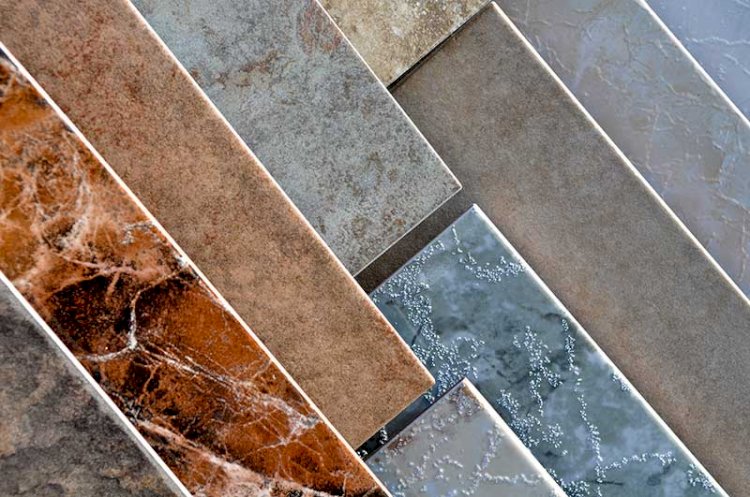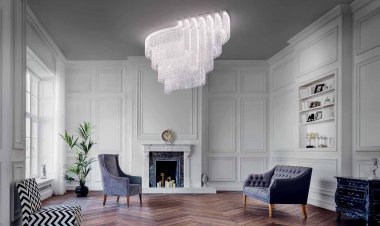Different Types of Tiles and Their Benefits

If you've never taken up a tiles collection challenge, you might just be surprised at the many different types of tiles that are available. Ceramic and porcelain are the most common but there are more to them. Starting from stone tiles, metal tiles, glass tiles, and even cement tiles- just to name a few.
They are used for decorative styling for flooring in the kitchen, bathrooms, parking lots, rooftops, and also as table tops for dining rooms, as they are available in a number of sizes, colors, shapes, and textures.
So, whether you are planning or shopping for an immediate project, we have listed twelve types of floor and wall tiles so as to help you navigate through the process. Stay on to find out which tiles are the best and for which purpose to ensure that you will love your design even in the years to come.
Ceramic tiles
This is the most common type of tile. It is versatile as it can be used in any room of the house, starting from the entryways to the kitchen and bathroom. Ceramic tile is budget-friendly and also easy to install and clean. It also comes in hundreds of styles thus suitable for any design. In addition, remember to understand the difference between glazed and unglazed.
Glazed ceramic tiles offer protection for longer-lasting floors while unglazed ones offer an artistic, rustic finish.
Porcelain tiles
Unlike ceramic tiles, porcelain's beauty comes from its ability to emulate natural stones, brick, or wood and does not require maintenance. In addition, it is an all-purpose tile and comes in a variety of styles, designs, and colors hence giving room for versatility. Porcelain can also be used outdoor as it will not fade, freeze, or crack.
The biggest drawback with this type of tile is the fact that installation can be a little bit tricky. Other than that, it is a beauty.
Marble tile
Even though the marble tile is costly, it adds an instant touch of elegance and refinement to any room it is installed. It is either veined or patterned hence if you are looking for stunning beauty for your kitchen and bath, this is the type of tile you'd want to go for.
The snag on the marble tile is in addition to being costly, it requires a lot of upkeep to keep it looking pristine. Just like every stone, marble tile is liable to etching, stains, and in addition to being difficult to clean. It is therefore advised that one may install it in less traffic areas or apply a sealant after installation.
Glass tile
The stain resistance of the glass tile makes it an ideal alternative. This tile type also offers a clean and minimalistic aesthetic.
The only foreseen disadvantage of this type of tile is that it easily chips off along the edges. It is therefore advised that it may be used in low traffic areas like around the fireplace.
Cement tiles
This type of tile is extremely versatile and will provide you with astonishing patterns and colors. Since they are very porous, a patina can develop over-time to enhance the pattern.
The disadvantage of this type of tiles is that they are a challenge to lay and must be resealed at least once a month to maintain their beauty. It is, therefore, advised that they may be used in fewer traffic areas and in small quantities.
Mosaic tiles
Mosaic tiles come in different styles, colors, shapes, sizes, and even materials. This gives you as a designer to use your creative ideas to bring forth a beautiful room. They are very ideal on the walls where the accent is needed. Mosaic is a little bit choosy as it requires you as the designer to know which room it is to be installed.
Resin tiles
These tiles are stylish and, water-resistant. They are ideal since they can imitate the look of water and stones and still allow for any sort of creativity as you can make your own patterns.
Their drawback is a propensity to chip and can also yellow over time, especially when subjected to the sun.
Limestone tile
Limestone tile is a natural stone tile. Its rich appearance and variety of colors and sizes make it ideal for any room, most especially for the outdoors. It delivers a natural style that is almost reminiscent of ancient architecture and design. Even though it is soft, it is still durable and very flexible to cuts for desired patterns and shapes.
One thing to keep in mind is that limestone tile is a porous rock hence requires proper sealing in order for you to get the best durability. If not properly sealed, it will crack and etch in no time. Also, to avoid ruining the stone, use neutral pH cleaning agents, and avoid citrus and vinegar-based products.
Granite tiles
Granite is another natural stone tile. It has a similar look and feels to marble because of its natural flecks, though there are notable differences. It is a cheaper alternative to marble.
It is advised that it may be used in laundry rooms where performance and lower costs are your top priority.
Travertine tiles
With the likes of limestone, travertine tiles offer natural, one-of-a-kind aesthetics. Its soft subdued palette provided beautiful neutral tones.
Even though it is ideal, its greatest snag is being affected by water, stains, and traction just like every other stone tile. For this reason, they require a lot of maintenance and once-a-decade resealing. It is then best to use it in low traffic areas of the house and on walls instead of floors so as to avoid scratching, etching, or even stains. If you decide to apply it on floors, make sure you have a clear plan on the cleaning products that you will use.
Metal tiles
Metal countertops offer the best durability and chic and modern aesthetics. Although its cost is similar to that of natural tiles, it will definitely withstand the test of time in both looks and function.
Quarry tiles
This type of tile is made of ground materials in a similar process to that of bricks (though technically stronger). These ground materials include; feldspar, clay, and shale. They are ground together and eventually baked at over 2000 degrees. You might be wondering if they are water-resistant since they are made from ground materials. The answer is, not only are they water-resistant but also naturally non-porous. This is because they are fired at high temperatures hence achieving all these features. An added advantage is that they do not require sealing.
Like every other thing, they do not lack some setbacks. One of them is staining. This means that they should not be used in kitchens. They are therefore recommended for high traffic areas as they offer a sense of purposeful design and are naturally slip-resistant.
These are the different types of tiles and their ideal places of use. So, the next time you want to get some for your project, remember the guides and most important of all, get the tiles that you feel convenient and pleasing to you

































